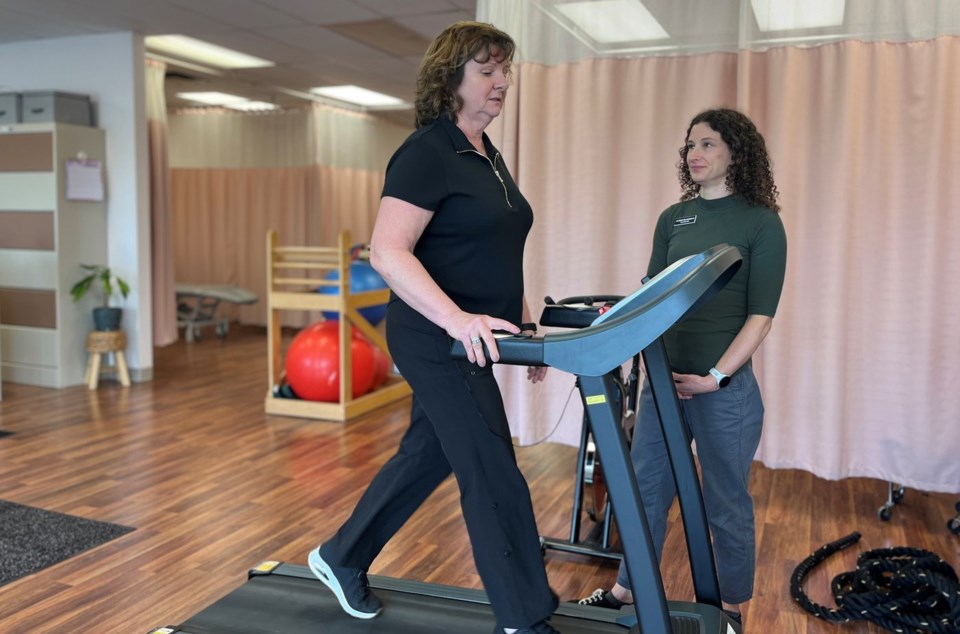TORONTO — Canadian researchers say a new study shows regular exercise improves survival for colon cancer patients.
The study, published Sunday in the New England Journal of Medicine, found that patients who participated in a supervised exercise program after completing their chemotherapy were 28 per cent less likely to have their colon cancer return than patients in the control group.
"It's the first clinical trial in the world asking whether exercise can improve cancer survival. And in fact, the results were astounding," Dr. Christopher Booth, a co-chair of the international study and a medical oncologist at Kingston Health Sciences Centre in Kingston, Ont., said in an interview.
The patients in the exercise group regularly met with a physical activity consultant — usually a physiotherapist, kinesiologist or personal trainer — to help them stick to a structured exercise program for three years.
The patients in the control group received health education materials that encouraged physical fitness after their chemotherapy, but were not given a physical activity support person.
The patients in the structured exercise group had a 37 per cent lower risk of death than those in the control group, the study said.
The study, which was conducted in cancer centres across Canada and in other countries including Australia and the U.K., shows a prescription for a structured exercise program should be part of the treatment for colon cancer, said Booth, who is also a professor of oncology at Queen's University.
"If we had a cancer drug with this amount of benefit, it would cost between $100,000 and $200,000 per year (and) it would be celebrated in all the major guidelines across oncology societies worldwide," he said.
"And there's no question it would be funded by health systems worldwide and included as a standard of care."
Although the research team hasn't yet done a formal cost-benefit analysis, Booth said the cost of providing a physical activity support person for three years would likely be between $3,000 and $5,000 per patient.
That would be a worthwhile investment for the health-care system to make, he said.
"When we have something like exercise, which is both incredibly affordable and sustainable for health systems with comparable magnitude of benefit, I think it would be a tragic failure of health policy not to ensure this is provided to all patients."
Booth and his colleagues started the randomized control trial, a model widely considered the gold standard in medical research, more than 15 years ago after seeing promising data in observational studies suggesting exercise would benefit colon cancer patients.
The trial included 889 colon cancer patients, followed between 2009 and 2024, who had completed their chemotherapy treatments.
The researchers assessed their baseline level of fitness and randomized them to assign half the participants to the structured exercise group and the other half to the control group.
Those in the exercise group saw a physical activity consultant every two weeks for their first year in the study and then once a month for two years afterward.
During those sessions, they would work on motivation and goal-setting to reach their targeted hours of exercise per week. The second part of the session was a supervised exercise session.
Their goal was to increase their exercise level by at least 10 metabolic equivalents, or METS, per week. A MET is a unit of energy expended.
Participants could choose what exercises they wanted to do as long as they met their MET target. Many chose brisk walking, which adds up to about four METS an hour.
One of those participants was Terri Swain-Collins, who lives in Kingston and is one of Booth's patients.
Now 62, Swain-Collins was diagnosed with stage 3 colon cancer in June 2021 after a screening test and follow-up colonoscopy.
When Booth asked if she would be interested in participating in the study, she didn't know whether she would be in the structured exercise group or the control group.
Swain-Collins was assigned to the exercise group. At the time, she was returning to work as a busy X-ray technologist after her treatment, plus helping to manage her husband's business, and wasn't sure where she'd find the time for exercise.
Thanks to the physiotherapist assigned to her, she was motivated to walk for at least 45 minutes, three times a week.
"Being accountable to her is what really helped me continue with it," Swain-Collins said in an interview.
"If I'd have been just told, you know, 'exercise is good for you and off you go,' I never would have done what I'm doing now," she said.
There's no sign of her cancer returning and Swain-Collins said she's "definitely" more fit now.
"I hope anyone diagnosed with cancer does get this type of opportunity," she said.
"I think it might really make a difference."
This report by The Canadian Press was first published June 1, 2025.
Canadian Press health coverage receives support through a partnership with the Canadian Medical Association. CP is solely responsible for this content.
Nicole Ireland, The Canadian Press




